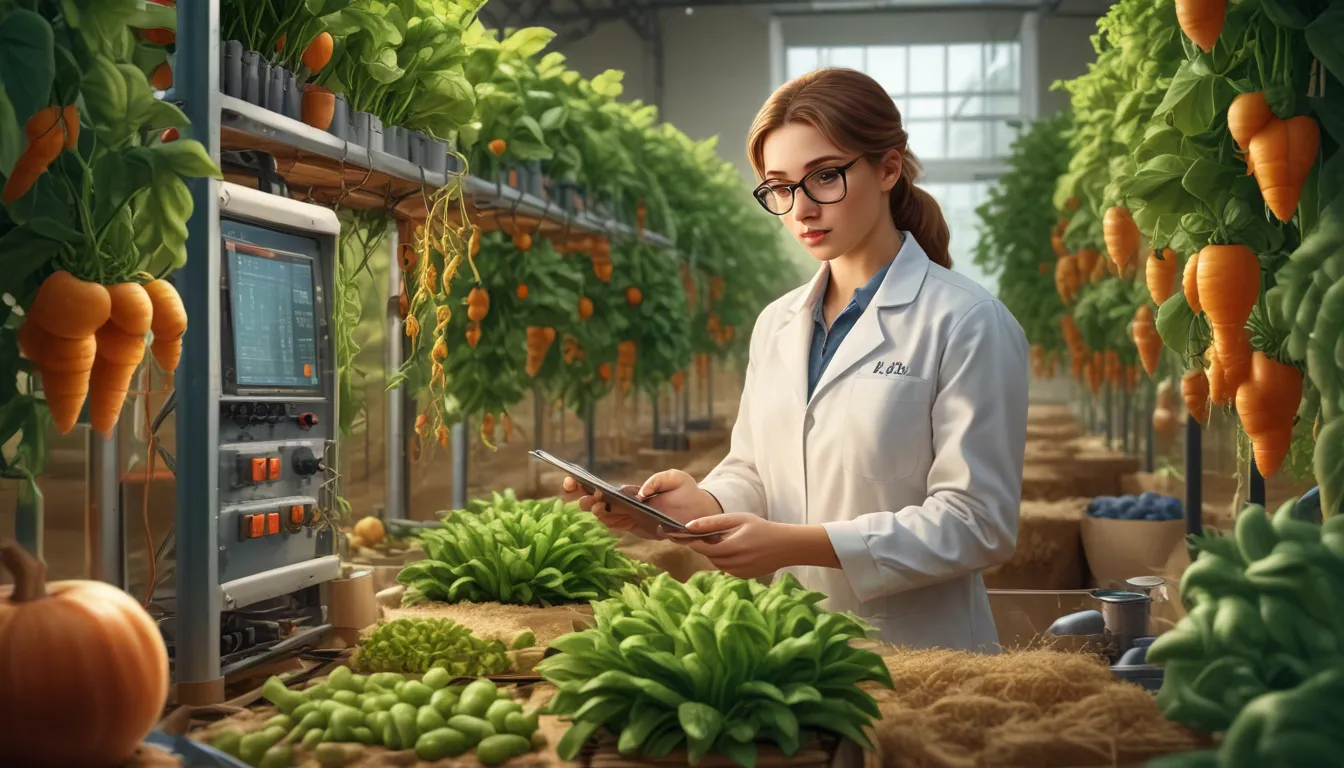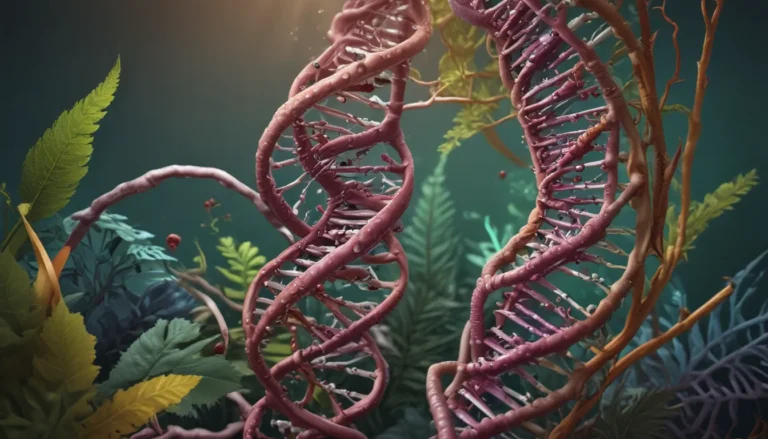A Note About Images: The images used in our articles are for illustration purposes only and may not exactly match the content. They are meant to engage readers, but the text should be relied upon for accurate information.
In the realm of agriculture, biotechnology stands as a beacon of innovation, offering groundbreaking solutions to enhance crop productivity, fortify resistance against pests and diseases, and elevate the quality of food. With the advent of genetic engineering, scientists have ventured into a realm where they can finely tune the genetic blueprint of plants to manifest desired traits, giving rise to the phenomenon known as agricultural biotechnology. This cutting-edge discipline has ignited a flurry of excitement and debate among scientists, policymakers, and the general public. Join us on a captivating journey as we unveil 19 enigmatic facts about agricultural biotechnology, shedding light on its potential benefits, controversies, and future implications. From the realm of genetically modified organisms (GMOs) to the realm of gene editing techniques, we delve into the captivating realm of agricultural biotechnology, exploring its profound impact on our food system.
Illuminating Insights:
- Agricultural biotechnology serves as a beacon of hope, offering solutions to global food security, environmental sustainability, and human health through the avenues of genetic engineering. This realm presents a tapestry woven with both benefits and challenges, demanding thoughtful consideration and collaborative efforts. By embracing the marvels of agricultural biotechnology, we can effectively tackle pressing issues such as food shortages, environmental degradation, and public health concerns. However, it is imperative to navigate ethical and environmental dilemmas with prudence to ensure responsible and transparent utilization of these technologies.
A Glimpse into History:
- Embark on a journey back in time, for agricultural biotechnology has roots that stretch back millennia. Since ancient civilizations, farmers have practiced the art of selectively breeding plants and animals to enhance coveted traits. The advent of modern biotechnology has ushered in a new era, enabling precise and efficient genetic manipulation.
The Marvel of GMOs:
- Genetically modified organisms (GMOs) stand as a testament to the transformative power of agricultural biotechnology. These organisms bear genetic modifications crafted through advanced engineering techniques. These modified crops hold the potential to amplify yields, boost nutritional value, and diminish reliance on chemical pesticides.
Enhancing Global Food Security:
- Against the backdrop of a burgeoning global population projected to reach 9.7 billion by 2050, agricultural biotechnology emerges as a harbinger of sustainable solutions. By elevating crop productivity and resilience, this realm serves as a staunch guardian of a stable food supply for future generations.
Nurturing Sustainability:
- Biotechnology’s realm extends beyond productivity to embrace sustainability through the alleviation of pesticide usage in agriculture. By nurturing the development of pest-resistant crops, biotechnology empowers farmers to curtail chemical pesticide dependency, fostering environmental health and safeguarding agricultural workers and consumers.
Unveiling Golden Rice:
- In the fight against vitamin A deficiency, a pervasive global health concern, Golden Rice emerges as a beacon of hope. Enriched with beta-carotene, a precursor to vitamin A, this genetically modified crop boasts the potential to fortify nutrition and combat blindness in vulnerable populations.
Fortifying Resilience:
- Agricultural biotechnology emerges as a shield against the perils of climate change by heightening crop resilience. By infusing genes that confer drought, heat, and pest tolerance, biotechnology equips crops to navigate shifting environmental landscapes, safeguarding food security.
Pioneering Livestock Health:
- Through the avenues of genetic selection and modification, biotechnology steps into the realm of livestock production, enhancing animal health and welfare. This transformative approach bolsters disease resistance and overall livestock well-being, fostering sustainable and ethical farming practices.
Spearheading Pharmaceuticals:
- The precincts of biotechnology pave the way for a revolution in the pharmaceutical sphere. By harnessing biotechnological methodologies, scientists forge a path towards efficient and cost-effective production of therapeutic proteins, vaccines, and pharmaceutical compounds, heralding a new era in disease management.
Biodiversity Conservation:
- Biotechnology emerges as a stalwart guardian of biodiversity through the preservation and restoration of endangered plant species. This realm serves as a vital tool in the conservation of ecosystems essential for planetary health.
Challenges and Concerns:
- The widespread adoption of GMOs has stoked a fiery debate concerning potential impacts on human health, the environment, and farmers’ rights. It is imperative to navigate these concerns with a discerning eye, ensuring responsible and transparent biotechnological deployment in agriculture.
The Path of Regulation:
- Venturing into the realm of biotechnology involves substantial investment in research and development. The development of novel biotechnologies and the intricate web of regulatory processes demand robust financial backing to support scientific progress and ensure safe technology deployment.
Embracing Sustainability:
- Biotechnology stands as a torchbearer for sustainable farming practices, reducing chemical inputs, enhancing resource efficiency, and combating land degradation. This realm aligns seamlessly with the ethos of sustainable development and environmental stewardship.
Nutritional Enrichment:
- By delving into genetic modification, biotechnology unveils the potential to enrich crops with essential nutrients, such as vitamins and minerals. This transformative approach holds the key to addressing nutritional deficiencies and elevating global public health.
The Path of Regulation:
- Governments worldwide have implemented stringent regulatory frameworks to evaluate genetically modified crops’ safety and ensure accurate labeling. This stringent oversight bolsters public trust and confidence in the biotechnological realm.
Agricultural Efficiency:
- Biotechnology ascends as a beacon of agricultural efficiency, nurturing the development of crops requiring fewer resources, such as water and fertilizers. This transformative shift paves the way for optimized agricultural productivity in regions grappling with resource constraints.
Unraveling Drug Discovery:
- The realms of plant and microbial genomics herald a new dawn in drug discovery, uncovering bioactive compounds ripe for pharmaceutical development. This revolutionary leap expands biotechnology’s horizons beyond agriculture.
Championing Bioremediation:
- By harnessing the inherent capabilities of microorganisms, biotechnology unveils innovative solutions for environmental cleanup. This realm ushers in bioremediation technologies offering respite from industrial pollution and ecosystem restoration.
In conclusion, the realm of agricultural biotechnology unfolds a tapestry woven with enigmatic facts that have reshaped our approach to food production and sustainability. From the corridors of genetically modified crops to the realms of advanced breeding techniques, biotechnology stands as a stalwart ally against global challenges such as climate change, crop diseases, and pests. Through scientific ingenuity, agricultural biotechnology has propelled us towards enhanced crop yields, diminished pesticide usage, and fortified nutritional profiles in agricultural produce. It stands as a pillar supporting the development of drought-resilient and disease-resistant crops, empowering farmers to surmount environmental adversities and enhance food production efficiency. However, it is imperative to tread carefully, considering ethical, environmental, and social implications entwined with agricultural biotechnology. Striking a delicate balance between benefits and potential risks is paramount to ensuring the sustainable and responsible evolution of these technologies. As we navigate the uncharted waters of agricultural biotechnology, fostering dialogue, transparency, and collaboration among scientists, policymakers, farmers, and consumers remains essential in crafting informed decisions benefiting present and future generations.
Frequently Asked Questions:
- What is agricultural biotechnology?
-
Agricultural biotechnology encompasses the use of scientific techniques like genetic engineering and advanced breeding methodologies to modify and enhance plants, animals, and microorganisms for agricultural purposes.
-
What are genetically modified crops?
-
Genetically modified crops refer to plants genetically altered using biotechnology to manifest desired traits such as pest or disease resistance, environmental adaptability, and enhanced productivity.
-
Are genetically modified crops safe for consumption?
-
Extensive scientific scrutiny has demonstrated the safety of genetically modified crops for consumption. Stringent regulatory assessments ensure compliance with safety standards, validating their equivalence to non-genetically modified counterparts.
-
How does agricultural biotechnology foster sustainability?
-
Agricultural biotechnology bolsters sustainability by amplifying crop productivity, curbing chemical inputs, and fortifying resistance against pests and diseases. This transformative realm champions sustainable agriculture by mitigating environmental impacts and conserving natural resources.
-
What are the benefits of agricultural biotechnology?
-
The benefits of agricultural biotechnology encompass heightened crop yields, enriched nutritional content in foods, bolstered pest and disease resistance, diminished reliance on chemical pesticides, and adaptability to changing environmental conditions.
-
What are the potential risks associated with agricultural biotechnology?
-
Potential risks linked to agricultural biotechnology encompass inadvertent dissemination of genetically modified organisms, the emergence of herbicide-resistant weeds, and potential impacts on non-target organisms and ecosystems. Regulators diligently assess and manage these risks through stringent frameworks.
-
How is agricultural biotechnology regulated?
-
Governments worldwide implement diverse regulatory mechanisms to evaluate the safety, effectiveness, and environmental repercussions of genetically modified crops prior to commercial release.
-
Are there labeling requirements for genetically modified foods?
-
Labeling stipulations for genetically modified foods exhibit variance across countries, ranging from mandatory labeling in some regions to voluntary or absent requirements in others.
-
How does agricultural biotechnology impact small-scale farmers?
-
Agricultural biotechnology can benefit small-scale farmers by granting access to improved crop varieties endowed with resilience against pests, diseases, and environmental stressors. However, challenges like affordability and accessibility to biotechnological tools and seeds may pose hurdles for some small-scale farmers.
-
How can consumers make informed choices about genetically modified foods?
- Consumers can make informed decisions regarding genetically modified foods by sourcing information from reputable sources, perusing product labels, and comprehending the prevailing regulatory paradigms. Engaging in meaningful discourse and keeping abreast of agricultural biotechnology advances remain pivotal in consumer decision-making.
Embark on a riveting journey through the realm of agricultural biotechnology, where marvels unfold at every turn, offering solutions to global challenges and fostering sustainability. The future of agriculture gleams brightly, guided by the transformative power of biotechnology, illuminating a path towards enhanced food production efficiency and environmental stewardship. Let curiosity be your compass as you traverse the enthralling landscape of genetic engineering, unlocking a realm brimming with potential and possibilities. Your voyage into the world of biotechnology promises to be enlightening and inspiring, unveiling the myriad ways in which science shapes our agricultural landscape for the better.






